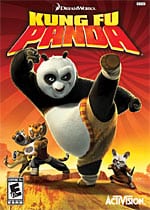A Fun Panda Adventure
From what I’ve seen, Kung Fu Panda is going to be a heartwarming tale of how a wannabe Panda becomes a Kung Fu legend. It looks like one of those family-friendly, heartwarming tales that’ll make even the hardest hearted person feel all mushy inside. This kind of warm and fuzzy family movie hardly sounds like exciting material for a game, but despite having roots in a children’s movie, Kung Fu Panda somehow manages to separate itself from the chaff in the movie game genre. It may be a simplistic and somewhat formulaic puzzle-platformer, but it looks pretty good and actually plays rather well.
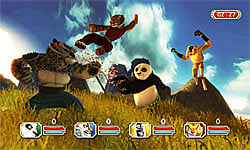
The plot of the game hails directly from the movie that inspired it. The main character is Po, a panda with big Kung Fu dreams. However, the reality is he works in a noodle shop with his father and has a somewhat meager existence compared to the Kung Fu all-stars he idolizes. However, through a series of fortunate (and often hilarious) events, he is named as the legendary Dragon Warrior by the town’s eldest Kung Fu master. To the chagrin of his family and all the other Kung Fu masters, he is catapulted into the highest ranks of Kung Fu. What follows is a warm and fuzzy tale of self-discovery and the power of dreams.
For most of the game you play as Po, but other characters are playable as time goes on. The game follows a strictly puzzle-platform format, and you will have to solve environmental puzzles while fighting off enemies. Most of the puzzle gameplay is fairly straightforward, but it is worth noting that in some of the more advanced levels the puzzles can become quite difficult. You will have to analyze different structures, use environmental objects, and find switches in some pretty complicated maps. Sometimes levels are timed, so there is extra pressure to do well.
The combat system, as you might expect, is firmly rooted in the movie’s “Panda-Style” of Kung Fu. There are three main types of attack at your disposal: power, quick, and special. The power and quick attacks are the easiest to access, and each has their own button assignment. You can also chain together your quick and power attacks for ultra-powerful combo attacks. Special attacks will require a bit more effort to perform and generally require certain movements (like running, jumping, etc.) plus the action button. These attacks also use up an amount of Po’s Chi, which is represented by a blue bar that refills as time goes on. .
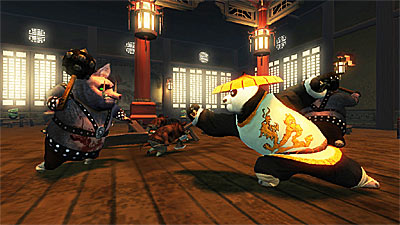
But the most remarkable thing about the combat system is it resembles an RPG, where you can earn points to purchase upgrades for your characters. But instead of upgrading overreaching stats like in a traditional RPG, Kung Fu Panda lets you upgrade individual moves and attributes. For example, if you like the Panda Quake or Panda Stumble special moves, you can upgrade them to become as destructive as possible. You can also upgrade individual attacks, combo moves, and even different facets of your defense. This system is really great and helps add a little bit of strategic planning to the gameplay. It also adds a little bit of replay value, as you can gain more points by going through stages more than once in order to max out your stats before an important boss battle.
In the single-player mode, there are also some optional quests you can complete to unlock bonus content. These side quests generally involve scouring the level for a certain amount of items, finishing off all the enemies, or completing a task in a certain amount of time. The unlocked bonus game content includes new modes and playable characters. The optional quests add some value to this title for more seasoned gamers, as some of them are quite difficult and definitely add to the game’s overall appeal.
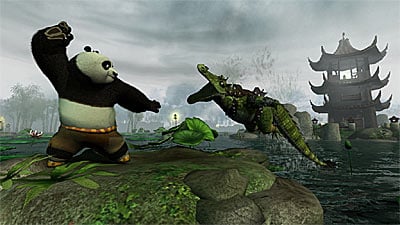
In addition to single-player, there are also several multiplayer modes. These modes have to be unlocked via the single-player mode, but once unlocked, they offer a pretty fun experience. Modes include straight-up battles between opponents, team battles, and survival. There’s even a melee-based game of concentration that challenges you to not only find matching cards, but to prevent the other opponent from getting matches by beating them up! These modes are pretty short, but the fact that there’s so many of them provides a fairly, long-lasting experience. The multiplayer modes have support for up to four players, so it is a great opportunity for families to play together.
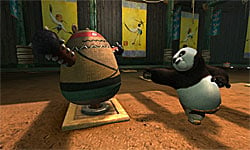
Kung Fu Panda’s visuals are on-par with the majority of modern games. The game sports 1080i graphics, and both characters and environments look great. Characters and animations in particular are very smooth, and I was very impressed with the fluidity of the character movement in-game. However, there were a few issues with the visuals. One big problem was the camera. Although it is fully mobile, it tends to focus too closely on your character, which hinders you from seeing stages completely. Because many of the stages have environmentally-based puzzles, this becomes a very serious problem, and there is no way to manually override the auto zoom function.
Sound in this game is pretty good and features some great voice acting as well as background music. I suppose the voice actors are not the original cast from the movie, but they sound very similar. The voice of Po, in particular, sounds exactly like Jack Black, and though I have found no evidence in the game’s packaging that says it is him, I would not be surprised if it was actually his voice. Background music is very cute and nice to listen to, probably because it came from the movie’s score.
Kung Fu Panda is definitely one of the better movie-inspired games I’ve played. The combat system as well as the puzzle-platforming style of the game work well together, and the whole game is fun to play. The game itself is not particularly memorable, but it provides a fun experience for those who enjoyed the movie. Despite its minor issues, if you are in the market for a movie-inspired game, Kung Fu Panda is a great choice and provides plenty of opportunities for children and adults to play together. Plus, who can say no to such a cute-but-deadly Kung Fu Panda?
RATING OUT OF 5 RATING DESCRIPTION 4.0 Graphics
Pretty much next-gen standard, with some particularly nice animation. However, the automatic zoom of the camera sometimes hinders you from getting the entire field of view. 4.5 Control
Extremely easy to learn, but the combo system adds enough depth to keep you engaged. 4.1 Music / Sound FX / Voice Acting
Voice acting is excellent, and the level music is very cute. 4.0 Play Value
Unlockable multiplayer modes and optional side missions give this title a fair amount of replay value. 4.2 Overall Rating – Great
Not an average. See Rating legend above for a final score breakdown.
Game Features:
